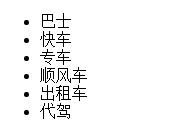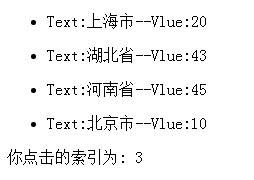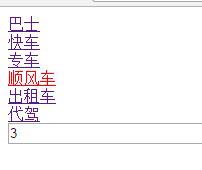vue.js中怎么使用v-for-創(chuàng)新互聯(lián)
小編給大家分享一下vue.js中怎么使用v-for,希望大家閱讀完這篇文章后大所收獲,下面讓我們一起去探討吧!

2.x版本:
v-for="(item,index) in items"
index即索引值。
==========================分割線==============================
1.x版本:
1.v-for
示例一:
<!DOCTYPE html><html><head>
<meta charset="utf-8">
<meta name="viewport" content="initial-scale=1.0, maximum-scale=1.0, user-scalable=no" />
<title></title></head><body>
<p id="didi-navigator">
<ul>
<li v-for="tab in tabs">
{{ tab.text }} </li>
</ul>
</p>
<script src="js/vue.js" type="text/javascript" charset="utf-8"></script>
<script type="text/javascript">
new Vue({
el: '#didi-navigator',
data: {
tabs: [
{ text: '巴士' },
{ text: '快車' },
{ text: '專車' },
{ text: '順風(fēng)車' },
{ text: '出租車' },
{ text: '代駕' }
]
}
}) </script></body></html>
2.索引
在 v-for 塊內(nèi)我們能完全訪問父組件作用域內(nèi)的屬性,特殊變量 $index是當(dāng)前數(shù)組元素的索引:
<ul id="example-2">
<li v-for="item in items">
{{ parentMessage }} - {{ $index }} - {{ item.message }} </li></ul>var example2 = new Vue({
el: '#example-2',
data: {
parentMessage: 'Parent',
items: [
{ message: 'Foo' },
{ message: 'Bar' }
]
}
})
另外,你可以為索引指定一個(gè)別名(如果 v-for 用于一個(gè)對(duì)象,則可以為對(duì)象的鍵指定一個(gè)別名):
<p v-for="(index, item) in items">
{{ index }} {{ item.message }}</p>從 1.0.17 開始可以使用 of 分隔符,更接近 JavaScript 遍歷器語(yǔ)法:
<p v-for="item of items"></p>
示例二:
<!DOCTYPE html><html><head>
<meta charset="utf-8">
<meta name="viewport" content="initial-scale=1.0, maximum-scale=1.0, user-scalable=no" />
<title></title></head><body>
<ul>
<li v-for="option in options">
<p class="text-success" v-on:click="getIndex($index)">Text:{{option.text}}--Vlue:{{option.value}}</p>
</li>
</ul>
<p v-if="isNaN(click)==false">
<span>你點(diǎn)擊的索引為: {{ click }}</span>
</p>
<p v-else>
<p class="text-danger">試著點(diǎn)擊上方LI條目</p>
</p>
<script src="js/vue.js" type="text/javascript" charset="utf-8"></script>
<script type="text/javascript">
new Vue({
el: 'body',
data: {
click: 'a',
options: [
{ text: '上海市', value: '20' },
{ text: '湖北省', value: '43' },
{ text: '河南省', value: '45' },
{ text: '北京市', value: '10' }
]
},
methods:{
getIndex:function($index){ this.click=$index;
}
}
}); </script></body></html>
3.在點(diǎn)擊事件中取到索引
方法一:添加自定義屬性
示例三:
<!DOCTYPE html><html>
<head>
<meta charset="UTF-8">
<title></title>
<style type="text/css">
a{display: block;}
</style>
</head>
<body>
<p>
<a v-for="(index,item) in items" data-index="{{index}}" v-on:click="onclick" href="http://www.baidu.com">{{ item.text }}</a>
</p>
<input type="text" name="" id="index" value=""/>
<script src="js/vue.js" type="text/javascript" charset="utf-8"></script>
<script type="text/javascript">
new Vue({
el: 'body',
data: {
items: [
{ text: '巴士' },
{ text: '快車' },
{ text: '專車' },
{ text: '順風(fēng)車' },
{ text: '出租車' },
{ text: '代駕' }
]
},
methods: {
onclick:function(event){
event.preventDefault();
let target = event.target
console.log(target.getAttribute("data-index"));
document.getElementById('index').value = target.getAttribute("data-index");
}
}
}) </script>
</body></html>
方法二:直接傳入索引值
示例四(和二差不多):
<!DOCTYPE html><html><head><meta charset="UTF-8"><title></title><style type="text/css">a{display: block;}</style></head><body><p>
<a v-for="(index,item) in items" v-on:click="onclick($index)" href="#">{{ item.text }}</a></p><input type="text" name="" id="index" value=""/><script src="js/vue.js" type="text/javascript" charset="utf-8"></script>
<script type="text/javascript">
new Vue({
el: 'body',
data: {
items: [
{ text: '巴士' },
{ text: '快車' },
{ text: '專車' },
{ text: '順風(fēng)車' },
{ text: '出租車' },
{ text: '代駕' }
]
},
methods: {
onclick:function(index){// index.preventDefault();
console.log(index);
document.getElementById('index').value = index;
}
}
})</script></body></html>效果與方法一相同。
不過有鏈接時(shí):

與取索引雖然不沖突,但是如果要對(duì)所跳的鏈接做進(jìn)一步操作,則無(wú)法阻止跳轉(zhuǎn)事件:

如果想直接傳索引可以用以下方法:
示例五:
<!DOCTYPE html><html>
<head>
<meta charset="UTF-8">
<title></title>
<style type="text/css">
a{display: block;}
</style>
</head>
<body>
<p>
<a v-for="(index,item) in items" v-on:click="onclick($index)" href="javascript:void(0)">{{ item.text }}</a>
</p>
<input type="text" name="" id="index" value=""/>
<script src="js/vue.js" type="text/javascript" charset="utf-8"></script>
<script type="text/javascript">
new Vue({
el: 'body',
data: {
items: [
{ text: '巴士' },
{ text: '快車' },
{ text: '專車' },
{ text: '順風(fēng)車' },
{ text: '出租車' },
{ text: '代駕' }
]
},
methods: {
onclick:function(index){// index.preventDefault(); console.log(index);
document.getElementById('index').value = index;
window.location.href = "http://www.baidu.com";
}
}
}) </script>
</body></html>補(bǔ)充:
4.關(guān)于v-for版本2.0與1.x的區(qū)別
2.0版本的示例五:
<!DOCTYPE html><html>
<head>
<meta charset="UTF-8">
<title></title>
<style type="text/css">
a{display: block;}
</style>
</head>
<body>
<p id="for5">
<a v-for="(item,index) in items" v-on:click="onclick(index)" href="javascript:void(0)">{{ index }}{{ item.text }}</a>
</p>
<input type="text" name="" id="index" value=""/>
<script src="js/vue2.js" type="text/javascript" charset="utf-8"></script>
<script type="text/javascript">
new Vue({
el: '#for5',
data: {
items: [
{ text: '巴士' },
{ text: '快車' },
{ text: '專車' },
{ text: '順風(fēng)車' },
{ text: '出租車' },
{ text: '代駕' }
]
},
methods: {
onclick:function(index){
console.log(index);
document.getElementById('index').value = index;// window.location.href = "http://www.baidu.com"; window.location.href = "#";
}
}
}) </script>
</body></html>變化如下:
- el處需id,寫body報(bào)錯(cuò);
- 參數(shù)index需寫在item后面;
- 作為事件參數(shù)時(shí)不用加$符。
此外,也可以提供第二個(gè)的參數(shù)為鍵名:
<p v-for="(value, key) in object">
{{ key }} : {{ value }}</p>第三個(gè)參數(shù)為索引:
<p v-for="(value, key, index) in object">
{{ index }}. {{ key }} : {{ value }}</p>看完了這篇文章,相信你對(duì)vue.js中怎么使用v-for有了一定的了解,想了解更多相關(guān)知識(shí),歡迎關(guān)注創(chuàng)新互聯(lián)行業(yè)資訊頻道,感謝各位的閱讀!
當(dāng)前標(biāo)題:vue.js中怎么使用v-for-創(chuàng)新互聯(lián)
本文地址:http://vcdvsql.cn/article32/ddhssc.html
成都網(wǎng)站建設(shè)公司_創(chuàng)新互聯(lián),為您提供品牌網(wǎng)站制作、微信小程序、Google、軟件開發(fā)、用戶體驗(yàn)、網(wǎng)站設(shè)計(jì)
聲明:本網(wǎng)站發(fā)布的內(nèi)容(圖片、視頻和文字)以用戶投稿、用戶轉(zhuǎn)載內(nèi)容為主,如果涉及侵權(quán)請(qǐng)盡快告知,我們將會(huì)在第一時(shí)間刪除。文章觀點(diǎn)不代表本網(wǎng)站立場(chǎng),如需處理請(qǐng)聯(lián)系客服。電話:028-86922220;郵箱:631063699@qq.com。內(nèi)容未經(jīng)允許不得轉(zhuǎn)載,或轉(zhuǎn)載時(shí)需注明來(lái)源: 創(chuàng)新互聯(lián)
猜你還喜歡下面的內(nèi)容
- vuex刷新時(shí)數(shù)據(jù)有丟失如何解決-創(chuàng)新互聯(lián)
- C--程序的完整生命周期-創(chuàng)新互聯(lián)
- C++vector使用的一些注意事項(xiàng)-創(chuàng)新互聯(lián)
- C語(yǔ)言——字符串的使用-創(chuàng)新互聯(lián)
- Python可以分幾個(gè)階段進(jìn)行學(xué)習(xí)-創(chuàng)新互聯(lián)
- 微信小程序可滑動(dòng)月日歷組件使用詳解-創(chuàng)新互聯(lián)
- 19個(gè)非常有用的jQuery圖片滑動(dòng)插件和教程-創(chuàng)新互聯(lián)

- 如何讓公眾號(hào)的內(nèi)容更有威力 2016-11-06
- 『微信公眾號(hào)運(yùn)營(yíng)技巧』微信公眾號(hào)的取名技巧 2022-06-24
- 微信公眾號(hào)如何利用gif動(dòng)圖快速增粉 2020-09-29
- 企業(yè)微信公眾號(hào)生存的現(xiàn)狀問題是什么? 2014-01-22
- 如何快速推廣微信公眾號(hào)? 2015-08-09
- 為什么企業(yè)會(huì)選擇微信公眾號(hào)開發(fā)呢 2021-11-23
- 微信公眾號(hào)的方案有幾種風(fēng)格? 2014-05-24
- 『微信公眾號(hào)原創(chuàng)』如何申請(qǐng)?jiān)瓌?chuàng)聲明功能? 2022-06-27
- 微信公眾號(hào)運(yùn)營(yíng)需避免五大誤區(qū) 2021-05-13
- 微信公眾號(hào)軟文廣告營(yíng)銷策略 2022-12-01
- 創(chuàng)建微信公眾號(hào) 2015-10-26
- 怎么做微信公眾號(hào)推廣? 2016-11-12